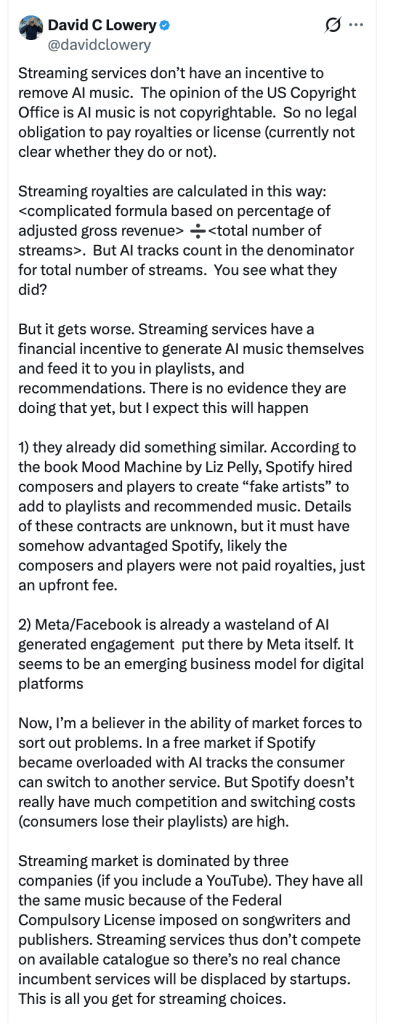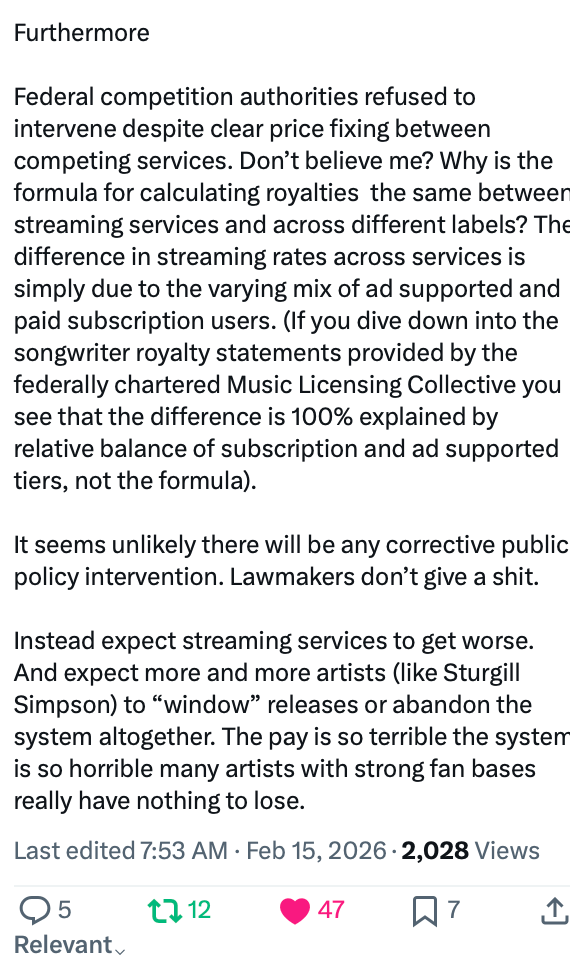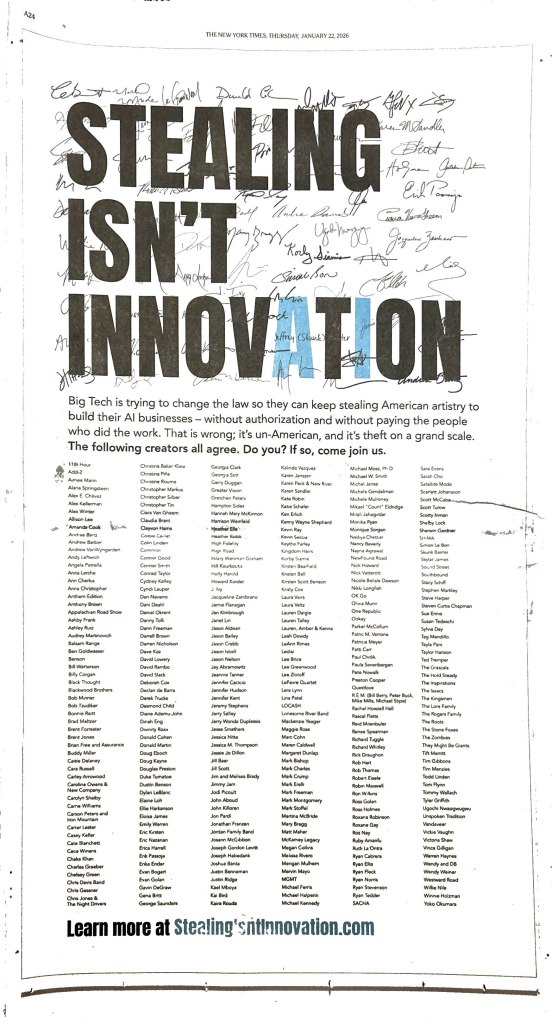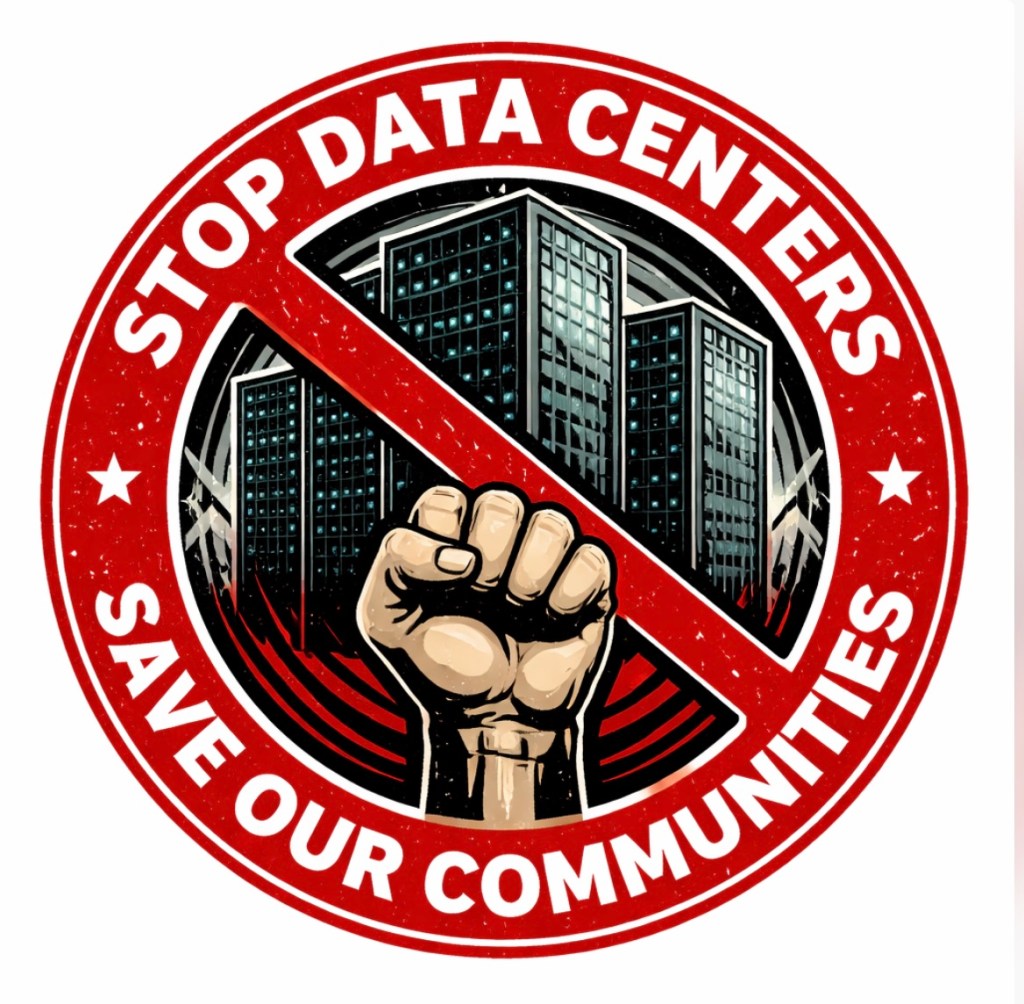Late last year, thieves disguised as construction workers broke into the Louvre during broad daylight, grabbed more than $100 million worth of crown jewels, and roared off on their motorbikes into the busy streets of Paris. While some of those thieves were later arrested, the jewelry they stole has yet to be recovered, and many fear those historic works of artistry have already been recut, reset, and resold.
Closer to home, but no less nefarious, is the brazen rip-off of artists enabled by irresponsible AI, whose profiteers are recutting, remixing, and reselling original works of artistry as something new. The hijacking of the world’s entire treasure-trove of music floods platforms with AI slop and dilutes the royalty pools of legitimate artists from whose music this slop is derived.
Meanwhile, those who are promoting this new business model are operating in broad daylight, too – minus the yellow safety vests. That is AI music company Suno, the brazen “smash and grab” platform whose “Make it Music” ad campaign suggests that the most personal and meaningful forms of music can now be fabricated by their unauthorized AI platform machinery trained on human artists’ work.
How significant is this activity? Publicly revealed data says Suno is used to generate 7 million tracks a day, a massive quantity that suggests a dominant market share of AI tracks. According to recent reports, Deezer “deems 85% of streams of fully AI-generated tracks [on its service] to be fraudulent,” and that such tracks include outputs from major generative models. As JP Morgan’s analysts said, Deezer’s data “should be indicative of the broader market.” Suno has yet to demonstrate persuasively that its platform does not, in practice, serve as a scalable input into streaming-fraud schemes — raising a serious concern that Suno has, in effect, become a fraud-fodder factory on an industrial scale.
In a February 2 LinkedIn post, Paul Sinclair, Suno’s Chief Music Officer, claims that his company’s platform is about “empowerment” that enables “billions of fans to create and play with music.” He argues that closed systems are “walled gardens” that deny people access to the full joy of music.
Ironically, Sinclair’s choice of analogy undermines his own argument. Ask yourself: just why are most gardens surrounded by fences or walls? To keep out rabbits, deer, raccoons and wild pigs seeking a free lunch. We cultivate, nurture and protect our gardens precisely because that makes them much more productive over the long run.
While Sinclair may be loath to admit it, AI is fundamentally different from past disruptive innovations in the music industry. The phonograph, cassettes, CDs, MP3s, downloads, streaming – all these technologies were about the reproduction and distribution of creative work. By contrast, irresponsible AI like Suno appropriates and plunders such creative work while undermining the commercial ecosystem for artists.
Think back to the days of Napster. What brought the music industry back from the ruinous abyss of unfettered digital piracy? It was the very “closed systems” that Sinclair derides as exclusionary. At least streaming platforms maintain access controls and content management systems that enable creator compensation, even if the economic outcomes for many creators remain inadequate. Should we be against Apple Music, Spotify, Deezer, YouTube Music, and Amazon Music? What about Netflix, Disney+ and HBO, too, while we’re at it?
At its core, Sinclair’s argument is just a tired remix of the old trope that “information wants to be free.” What that really means is: “We want your music for free.”
Artists need to understand Suno’s game. They are not putting technology in the service of artists; they are putting artists in the service of their technology. Every time artists’ creations are used by the platform, those creations have just unwittingly been contributed to the creation of endless derivatives of artists’ own work, not to mention AI slop, with limited or no remuneration back to the human creators. Suno built its business on our backs, scraping the world’s cultural output without permission, then competing against the very works exploited.
It’s also important to keep in mind that using Suno to generate audio output calls into question the copyrightability of whatever Suno creates. Most countries around the world including the US Copyright Office have been clear that generative AI outputs are largely ineligible for a copyright – meaning the economic value of the Suno creation lies solely with Suno, not with the artist using it. The only ones gaining empowerment from Suno are Suno themselves.
Many in our community are embracing responsible AI as a tool for creation, and as a means for fans to explore and interact with our artistry. That’s wonderful. But it’s not the same as creating an environment where AI-generated works sourced from our music are mass distributed to dilute our royalties or, worse yet, reward those actively seeking to commit fraud. Artists need to know the difference – all AI platforms are not the same, and Suno, which is being sued for copyright infringement, is not a platform artists should trust.
Responsible AI-generated music must evolve within a framework that respects and remunerates artists, enhances human creativity rather than supplants it, and empowers fans to engage with the music they love. At the same time, AI services must preclude mass distribution of slop and prevent fraudsters from destroying the very ecosystem that has been built to reward and sustain artists and audiences alike.
All of us, including billions of music fans, share an urgent, deep and abiding interest in protecting and rewarding human genius, even as AI continues to change our industry and the world in unimaginable ways. So in 2026, even as the Louvre continues to revamp its own approach to security, we in the arts must rise to confront those who would “smash-and-grab” our creativity for their own benefit.
Together, while embracing innovation, we must work to establish more effective safeguards – both legal and technological – that better promote and protect all creative artists, our intellectual property, and the spark of human genius.
Say no to Suno. Say yes to the beauty and bounty of the gardens that feed us all.
Signed:
Ron Gubitz, Executive Director, Music Artist Coalition
Helienne Lindvall, Songwriter and President, European Composer and Songwriter Alliance
David C. Lowery, Artist and Editor The Trichordist
Tift Merritt artist, Practitioner in Residence, Duke University and Artist Rights Alliance Board Member
Blake Morgan, artist, producer, and President of ECR Music Group.
Abby North, President, North Music Group
Chris Castle, Artist Rights Institute














You must be logged in to post a comment.